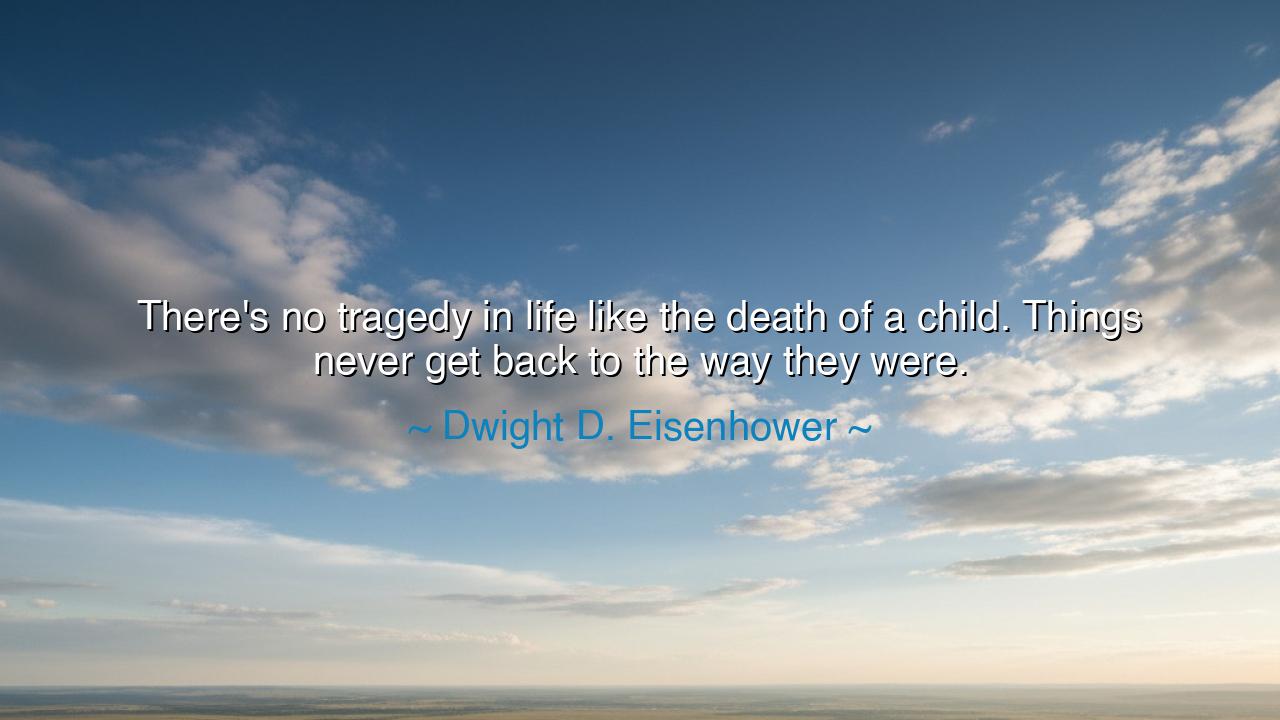
There's no tragedy in life like the death of a child. Things
There's no tragedy in life like the death of a child. Things never get back to the way they were.






In the solemn words of Dwight D. Eisenhower, the soldier, statesman, and father, there lies a truth that pierces the heart like no other: “There’s no tragedy in life like the death of a child. Things never get back to the way they were.” These are not words born of mere observation, but of deep personal sorrow. Eisenhower, the great general who led armies through the fires of war, knew the face of death well — yet none of those countless losses struck him as cruelly as the loss of his own young son, Icky, who died of scarlet fever at only three years old. From that wound came this reflection — the recognition that some griefs are not wounds we heal from, but marks we carry forever, etched into the soul like sacred scars.
For the death of a child is not simply the end of a life; it is the shattering of promise, the breaking of a bond as old as creation itself. It defies the order of nature — for parents are meant to precede their children into the grave, not the other way around. When a child dies, it feels as though the future itself has been undone. The laughter that once filled the home fades into silence, the toys remain untouched, and every sunrise reminds the grieving heart of what will never return. In this, Eisenhower’s words speak not only for himself, but for all who have stood beside that small, still form and realized that life will never again be what it once was.
And yet, in the style of the ancients, we must look deeply into this grief, for within its unbearable weight lies the mystery of love. The reason the death of a child is the greatest tragedy is because the love between parent and child is the purest reflection of creation itself — selfless, unguarded, eternal. To lose that love in the world is to feel, if only for a time, the dimming of heaven’s own light. And still, the love itself does not die. It changes form, becoming something unseen but no less powerful — a silent flame that endures beneath the ashes of sorrow. Those who have endured such pain often find, in time, that this love transforms into compassion, the ability to understand and comfort others who suffer. Thus, even tragedy can give birth to wisdom and tenderness.
Consider the story of Abraham Lincoln, who, like Eisenhower, bore the unbearable. His beloved son Willie died at age eleven while Lincoln was burdened with the weight of the Civil War. In the White House, the President was often seen weeping alone, whispering his son’s name in the night. The man who could face the ruin of a nation could not escape the ruin within his heart. And yet, from this pain grew his profound empathy — his ability to speak words that reached not only the minds but the souls of his people. The death of his child deepened him, making him more merciful, more human, more capable of understanding the sorrows of others. In that sense, grief became not an end, but a transformation.
Still, the truth remains as Eisenhower declared: things never get back to the way they were. For the parent who has lost a child, the world is divided into two times — before, and after. Joy may return, laughter may visit again, but it is never the same laughter; it carries the memory of what has been lost. The soul becomes both heavier and holier. Those who have endured this sorrow walk with a quiet dignity, for they have looked into the deepest shadow and survived. Their faith, if it endures, becomes a diamond — unbreakable, though forever marked by the pressure that forged it.
The lesson in Eisenhower’s grief is not one of despair, but of reverence. Life, fragile and fleeting, must be cherished as the sacred gift it is. Every moment with a loved one — every word spoken, every hand held — is a treasure that time cannot replace. To live with this awareness is to live with open eyes and a tender heart. For we cannot always prevent tragedy, but we can honor those we lose by living with gratitude and gentleness, carrying their light forward through our deeds.
So remember this, O children of the future: though death may take what is dearest, love transcends even the grave. The body may perish, but the bond between souls endures. Let Eisenhower’s sorrow become your wisdom — to love fiercely while you can, to speak kindly while there is time, and to never take the laughter of your child, your friend, or your companion for granted. For in this mortal life, nothing is promised — and yet, in love remembered and love given, we find eternity’s touch.
Thus, while the loss of a child may be the deepest tragedy, it also reveals the depth of our humanity. To mourn is to love still, and to love still is to defy death itself. And though, as Eisenhower said, things may never return to the way they were, perhaps — through compassion, memory, and faith — they can become something even more enduring: a life shaped not only by loss, but by the unending power of love that refuses to die.






AAdministratorAdministrator
Welcome, honored guests. Please leave a comment, we will respond soon